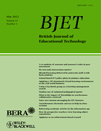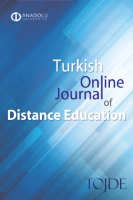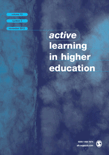
BRITISH JOURNAL OF EDUCATIONAL TECHNOLOGY
Scope & Guideline
Exploring New Frontiers in Educational Technology
Introduction
Aims and Scopes
- Educational Technology Integration:
Research on how technology can be effectively integrated into educational practices, including the use of various digital platforms and tools to enhance teaching and learning. - Learning Analytics and Assessment:
Studies that focus on the application of learning analytics to improve educational assessment, support self-regulated learning, and enhance understanding of student engagement and achievement. - Innovative Learning Environments:
Exploration of new learning environments, including virtual reality, augmented reality, and gamified learning, assessing their impact on student engagement, motivation, and learning outcomes. - Teacher Professional Development:
Research aimed at understanding how educators can be supported in using technology effectively in their teaching practices, including training and professional development initiatives. - Inclusive Education and Accessibility:
Investigations into how educational technologies can promote inclusivity and accessibility for diverse learners, including those with disabilities or from underrepresented backgrounds. - Collaborative Learning and Social Interaction:
Studies that examine how technology facilitates collaborative learning and social interaction among students, both in and out of the classroom. - Artificial Intelligence in Education:
Research exploring the role of artificial intelligence in educational contexts, including its use in personalized learning, assessment, and decision-making.
Trending and Emerging
- Personalized and Adaptive Learning:
There is an increasing emphasis on research related to personalized and adaptive learning technologies, showcasing how AI and data analytics can tailor educational experiences to individual student needs. - Gamification and Game-Based Learning:
A trend towards gamification and game-based learning strategies is evident, with studies exploring their effectiveness in enhancing student engagement, motivation, and learning outcomes. - Remote and Hybrid Learning Solutions:
In light of recent global shifts, research focusing on remote and hybrid learning solutions has surged, addressing best practices, challenges, and innovations in online education. - Social and Collaborative Learning Technologies:
Emerging research highlights the significance of social learning platforms and collaborative technologies, exploring how they facilitate interaction and community building among learners. - Ethics and Privacy in Educational Technology:
A growing focus on the ethical implications and privacy concerns associated with educational technologies is emerging, as researchers seek to understand the impact of data usage and AI in education. - STEM Education and Technology Integration:
There is an upward trend in research dedicated to the integration of technology in STEM education, particularly in how it supports inquiry-based learning and problem-solving skills.
Declining or Waning
- Traditional Learning Theories:
There has been a noticeable decrease in research centered solely on traditional learning theories without consideration of their integration with technology, as the field moves towards more innovative and technology-driven approaches. - Face-to-Face Learning Environments:
Studies focusing exclusively on traditional, face-to-face learning environments are becoming less common, as the journal increasingly emphasizes hybrid and online learning modalities. - Basic Technology Usage:
Research that merely addresses the basic use of technology in education, without exploring more complex interactions or innovative applications, is less prevalent, indicating a shift towards more advanced technological integrations. - Static Assessment Models:
There is a waning interest in static assessment models that do not incorporate adaptive or personalized approaches, as the focus shifts towards dynamic and responsive assessment methods. - Generalized Educational Technology Tools:
Papers discussing generic educational technology tools without specific contextual applications or innovative features are declining, as the journal seeks to highlight more tailored and impactful uses of technology.
Similar Journals

Turkish Online Journal of Distance Education
Empowering Educators through Open Access Insights.Turkish Online Journal of Distance Education, a distinguished publication from ANADOLU UNIVERSITY, serves as a vital resource in the field of distance education, contributing significantly to the ongoing discourse since its inception in 2000. With an impressive impact factor that reflects its standing within the academic community, this open access journal provides an influential platform for researchers, educators, and practitioners to disseminate innovative findings and educational strategies. Ranked in the Q2 category within the education sector according to the 2023 quartile rankings, and boasting a commendable position of #423 out of 1543 in Scopus' Social Sciences Education rankings, the journal places itself firmly within the 72nd percentile of its cohort. Spanning from 2004 to 2024, the journal's commitment to advancing scholarship in distance education is reflected not only in its comprehensive articles but also in its responsive engagement with contemporary educational challenges. Positioned in Eskişehir, Turkey, this journal aims to elevate discussions surrounding online learning and contributes to the global dialogue on education accessibility and innovation.

Active Learning in Higher Education
Innovating Educational Practices for Enhanced LearningActive Learning in Higher Education is a premier journal dedicated to exploring innovative and effective pedagogical practices within the realm of higher education. Published by SAGE Publications Inc, this journal boasts an impressive Q1 ranking in the Education category for 2023, positioning it within the top percentile of academic journals in the field, with a Scopus rank of 21 out of 1543, reflecting its high impact and relevance. With coverage spanning from 2000 to 2024, the journal serves as a critical platform for researchers, educators, and students, providing insightful articles that delve into the theories, strategies, and technologies that enhance active learning experiences. While currently not open access, the enriching content is vital for anyone aiming to stay abreast of evolving methodologies and empirical studies in educational practices. Located in the United Kingdom, this journal is committed to advancing the academic discourse surrounding higher education, making it essential reading for those interested in fostering student engagement and learning outcomes.

ETR&D-EDUCATIONAL TECHNOLOGY RESEARCH AND DEVELOPMENT
Driving Educational Excellence in a Digital AgeETR&D - Educational Technology Research and Development, published by Springer, is a premier journal dedicated to advancing the field of educational technology through rigorous research and development. With a history dating back to 1957, it has established itself as a leading resource for scholars and practitioners, maintaining a remarkable Q1 ranking in Education as of 2023, and standing at an impressive 41st out of 1543 in the Scopus rankings for Social Sciences - Education, placing it in the 97th percentile. This journal aims to bridge the gap between theory and practice, offering in-depth insights into the latest innovations and methodologies in educational technology. As a vital resource for researchers, educators, and technology developers, ETR&D highlights the interplay of technology, pedagogy, and learning environments, driving the evolution of educational practices in a digital era. Although not an open access journal, it provides comprehensive access options for institutional and individual subscribers, ensuring that key findings reach a broad audience. Discover the future of education through ETR&D's influential publications.

Journal of Teaching and Learning
Exploring the future of teaching and learning together.The Journal of Teaching and Learning, published by the University of Windsor, Faculty of Education, is a prominent open-access journal in the field of education, dedicated to fostering scholarly discussion and exploration. Since its inception in 2001, it has served as a vital platform for researchers, educators, and practitioners to share innovative insights and evidence-based practices that advance teaching and learning methodologies. With an impact factor reflective of its category quartiles, it currently ranks in the Q3 category for education according to the 2023 evaluation, standing at 834 out of 1543 in Scopus's social sciences education rankings. This journal aims to bridge theoretical frameworks with practical applications, providing a robust resource for those invested in enhancing educational outcomes. With an open-access model, the Journal of Teaching and Learning ensures that its contributions are readily accessible to a global audience, encouraging the dissemination of knowledge and collaborative learning experiences. The journal is published in Canada and welcomes submissions that explore current trends and future directions in teaching practices, learner engagement, and educational policy.

Revista Electronica de Investigacion Educativa
Championing Diversity in Educational Research and PracticeRevista Electronica de Investigacion Educativa, published by Universidad Autónoma Baja California, Inst Investigación & Desarrollo Educativo, serves as a pivotal platform in the field of education research. Established as an Open Access journal since 1999, it provides unrestricted access to a wealth of scholarly articles that contribute to the understanding and development of educational practices and policies. With a Q3 rank in the education category for 2023, it is recognized within the Scopus database, ranking #923 out of 1543 in the Social Sciences and Education sector, placing it in the 40th percentile. The journal aims to foster innovative research and interdisciplinary dialogue among educators, researchers, and policymakers, making significant strides in advancing educational methodologies and including diverse voices from the Latin American region. With coverage converging from 2006 to 2024, the Revista provides a snapshot of evolving educational trends and challenges, solidifying its role as an essential resource for those invested in educational development and research.

Contemporary Educational Technology
Advancing Knowledge at the Tech-Education FrontierContemporary Educational Technology is a premier journal published by BASTAS PUBL LTD - UK, specializing in the dynamic intersection of educational practices and technological advancements. With an E-ISSN of 1309-517X, this journal serves as a vital resource for researchers, educators, and professionals keen to explore innovative solutions and methodologies in education. Ranked in the Q2 category for both Education and Management of Technology and Innovation in 2023, Contemporary Educational Technology boasts impressive Scopus ranks, standing at #187 out of 1543 in the Social Sciences Education field, reflecting its influence and contribution to contemporary research. Through its open-access approach, this journal facilitates the dissemination of knowledge, making cutting-edge research readily available to a global audience. By examining developments from 2018 through 2024, it aims to critically analyze and promote the integration of technology in educational contexts, thereby fostering improved learning outcomes and innovative teaching practices.

TECHNOLOGY IN SOCIETY
Navigating the Intersection of Technology and HumanityTechnology in Society, published by Elsevier Science Ltd, is a premier journal dedicated to exploring the interplay between technological advancements and their societal implications. With an ISSN of 0160-791X and an E-ISSN of 1879-3274, this journal has established itself as a pivotal resource since its inception in 1979. The journal's impact factor and its prestigious Q1 ranking in categories including Business and International Management, Education, Human Factors and Ergonomics, and Sociology and Political Science underscore its significance in fostering high-quality scholarship. The journal aims to publish articles that critically examine the multifaceted effects of technology on society, making it essential reading for academics, practitioners, and policy-makers alike. As it continues to evolve through 2024, Technology in Society remains committed to disseminating important research that drives understanding and dialogue in today’s technology-driven landscape.

Electronic Journal of e-Learning
Exploring the Future of Learning with TechnologyElectronic Journal of e-Learning is a prominent peer-reviewed publication dedicated to the exploration and dissemination of advancements in the fields of e-learning, computer science applications, and educational technologies. Published by ACAD CONFERENCES & PUBL INT LTD since 2003 as an open-access journal, it facilitates the free exchange of knowledge, ensuring researchers, educators, and practitioners have unrestricted access to cutting-edge research and innovative practices. With an impressive impact factor reflecting its influence, the journal has achieved a Q2 ranking in both Computer Science Applications and Education for 2023, placing it among the top-tier journals in its field. The Electronic Journal of e-Learning serves as a crucial platform for scholarly discussions, helping to shape the future of educational practices and technology integration. As it converges from 2011 to 2024, the journal continues to invite submissions that advance the understanding and application of e-learning strategies across varied educational contexts.

Educar
Exploring the Nexus of Education and TechnologyEducar, published by the Universitat Autònoma de Barcelona, stands as a significant contributor to the fields of education, communication, and human-computer interaction. With an Open Access policy since 1982, this journal provides an invaluable platform for the dissemination of innovative research and insightful perspectives from diverse academic backgrounds. The journal boasts a commendable position in the 2023 category quartiles, ranking Q2 in Communication and Q3 in both Education and Human-Computer Interaction, which underscores its relevance and influence within these disciplines. Educar is indexed in Scopus and reflects a strong reception in the academic community, with its Social Sciences - Communication category ranked 173rd out of 511 journals, affirming its 66th percentile standing. Researchers and professionals will find this journal particularly useful for accessing a wide range of studies that not only push the boundaries of knowledge but also offer practical insights that enhance educational practices and technological engagement.

Technology Pedagogy and Education
Navigating the Evolving Landscape of Educational TechnologyTechnology Pedagogy and Education, published by Routledge Journals, Taylor & Francis Ltd, is a leading academic journal focused on the intersection of technology and educational practices. With an impact factor reflecting its significant contribution to the field, this journal provides a critical platform for disseminating innovative research and emerging trends in technology-enhanced learning. Serving as a resourceful hub since its inception in 2003, it has established itself in the top quartile of various categories, including Communication, Computer Science Applications, Education, and Information Systems. Researchers and educators alike will find the journal's insights invaluable as they navigate the ever-evolving landscape of educational technology. Although it does not currently offer open access options, its rigorous peer-review process ensures that only the highest quality research is published, making it essential reading for anyone invested in the educational sector.